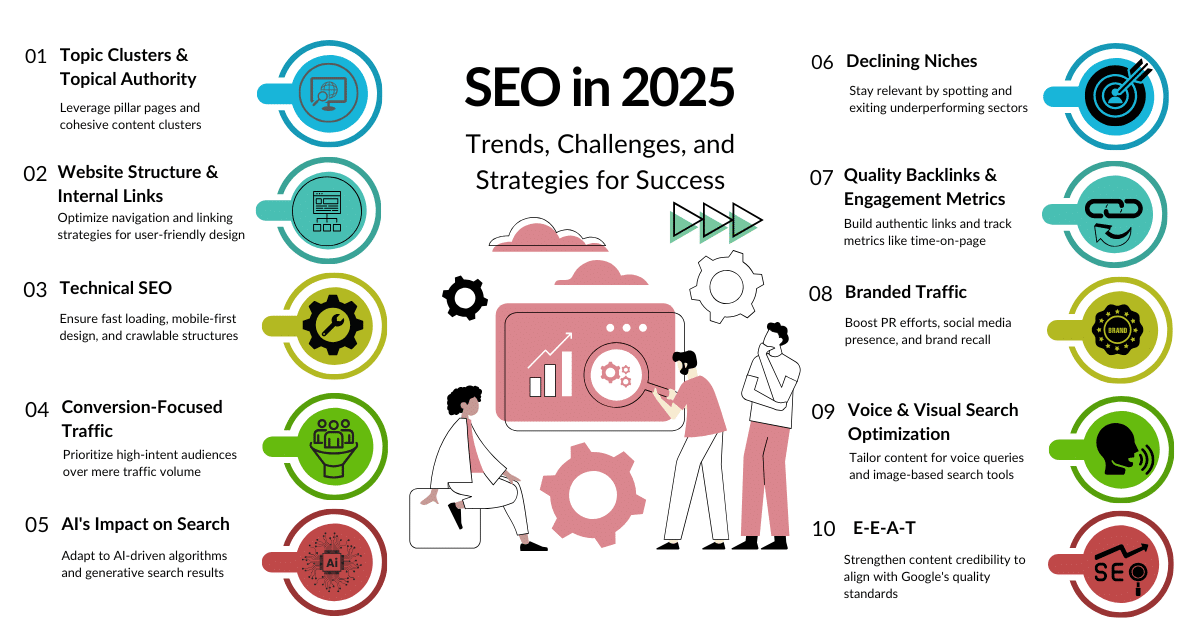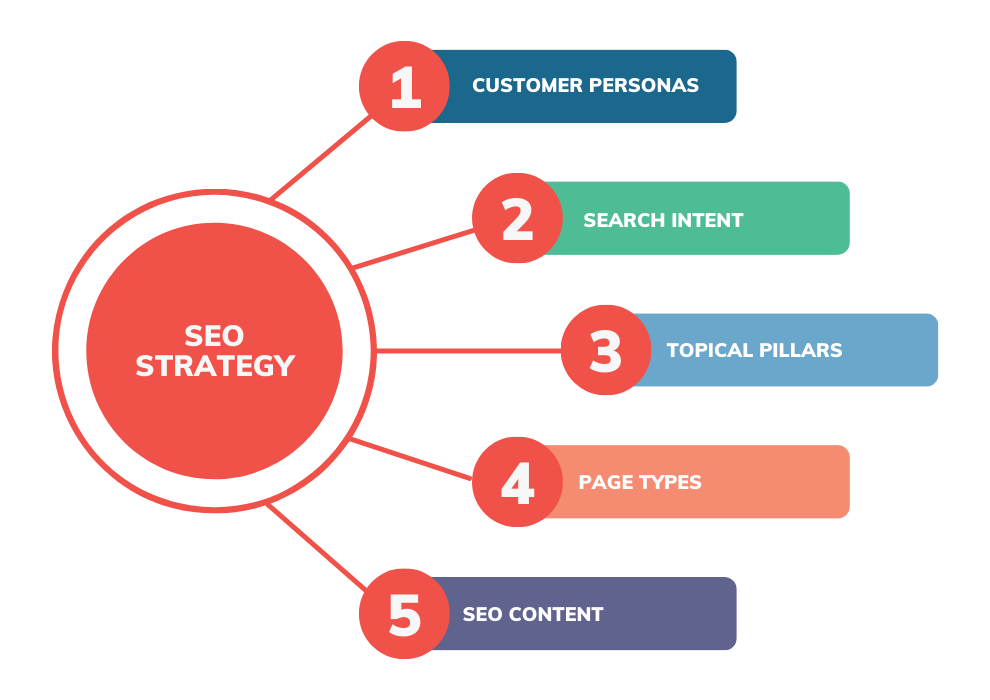Search Engine Optimisation (SEO) is a constantly evolving field, with search engines like Google regularly updating their algorithms. To ensure your website ranks higher and stands out in search results, it’s essential to stay up-to-date with the latest trends, technologies, and strategies. Here’s how you can optimise your SEO for 2025 and beyond.
1. Prioritise Core Web Vitals and User Experience (UX)
Google’s Core Web Vitals will continue to play a key role in ranking websites in 2025. These metrics assess how users experience a website in terms of performance, interactivity, and layout stability.
Core Web Vitals include:
- Largest Contentful Paint (LCP): Measures how long it takes for the main content of a page to load.
- First Input Delay (FID): How quickly the page responds to user interactions.
- Cumulative Layout Shift (CLS): The total amount of unexpected layout shift that happens as the page loads.
How to Optimise:
- Speed Up Site Load Times: Use modern compression techniques and optimise images.
- Mobile-First Design: Ensure that your website works seamlessly across mobile devices, as Google now uses mobile-first indexing.
- Responsive UI: Make sure your site’s navigation, buttons, and forms are easy to use on all screen sizes.
2. Invest in E-A-T (Expertise, Authoritativeness, Trustworthiness)
Google continues to place significant weight on E-A-T in its ranking algorithms, especially for YMYL (Your Money or Your Life) pages, like those covering health, finance, and legal topics.
How to Optimise:
- Create High-Quality Content: Publish content that is authoritative and credible. Back up your claims with data from experts or credible sources.
- Secure Trustworthy Backlinks: Build links from authoritative and relevant websites in your niche to boost your site’s authority.
3. Utilise AI-generated content and NLP (natural language processing).
With advancements in AI technologies like GPT-4, AI-generated content is becoming an essential tool for SEO. Google’s algorithms (BERT and MUM) focus on understanding content context, meaning, and intent.
How to Optimise:
- Use AI for Content Creation: Leverage AI tools for brainstorming topics, draughting content, and creating optimised headlines.
- Focus on NLP: Craft content that uses conversational language to cater to Google’s NLP algorithms, making it easier for the search engine to understand.
4. Optimise for Featured Snippets and Position Zero
Featured snippets are becoming more important as they provide concise answers to search queries. These snippets appear at the very top of search results, above traditional organic listings.
How to optimise:
- Answer Direct Questions: Format your content to answer direct questions like “What is SEO?” or “How to optimise a website?” concisely.
- Use Structured Data: Implement Schema Markup (JSON-LD) to help search engines better understand and display your content in rich snippets.
5. Optimise for Voice Search
With voice-activated devices like Siri, Alexa, and Google Assistant, voice search will continue to grow in importance. Optimising for voice search means focusing on conversational keywords and long-tail queries.
How to optimise:
- Use Conversational Keywords: Optimise for longer, more natural-sounding queries that users might speak aloud.
- Answer Directly: Ensure your content directly answers questions like “Who”, “What”, “Where”, and “How” in a clear, concise way.
6. Optimise Video Content for SEO
Video is a dominant form of content in 2025, with platforms like YouTube and TikTok still at the forefront. Optimising video content will be crucial to improving rankings.
How to optimise:
- YouTube SEO: Use keywords in your video titles, descriptions, and tags. Include transcripts and captions to enhance accessibility and searchability.
- Video Schema Markup: Implement structured data for videos to increase visibility in search results.
- Engage Viewers: Encourage likes, shares, and comments to boost your video’s engagement, as Google values user interaction.
7. Embrace Semantic Search and Intent-Based Optimisation
Search engines are becoming better at understanding user intent beyond just keywords. In 2025, optimising for semantic search will be more important than ever.
How to optimise:
- Use Topic Clusters: Organise your content around key themes and pillar pages, helping Google understand how different content pieces are related.
- Answer User Intent: Focus on user intent, whether informational, transactional, or navigational, to create relevant content.
- Local SEO: With improved semantic search, optimising for local search intent will be crucial for businesses with physical locations.
8. Focus on Mobile SEO
As mobile device usage continues to rise, optimising for mobile SEO is no longer optional. Google gives priority to mobile-friendly websites in its ranking algorithms.
How to optimise:
- Responsive Design: Ensure that your website design adapts seamlessly to all screen sizes.
- Page Speed: Use tools like Google PageSpeed Insights to ensure your mobile pages load quickly.
- AMP (Accelerated Mobile Pages): Consider using AMP to ensure lightning-fast mobile page loading times.
9. Personalisation and user search behaviour
In 2025, SEO will increasingly focus on providing personalised experiences for users. Understanding user behaviour and tailoring content accordingly will be essential.
How to optimise:
- Use Analytics: Utilise tools like Google Analytics to track how users interact with your site and what they’re looking for.
- Tailor Content: Create personalised content, offers, or recommendations based on user preferences, location, or browsing history.
10. Local SEO Optimisation
Local SEO will remain a key focus in 2025, especially for businesses targeting specific geographic locations. Google My Business (GMB) and localised searches are critical for improving visibility in local searches.
How to optimise:
- Claim and Optimise Google My Business: Ensure your GMB listing is up-to-date with accurate contact information, hours, and business details.
- Use Local Keywords: Include location-specific keywords in your content, meta tags, and GMB listing to target local search queries.
- Encourage Reviews: Positive customer reviews on platforms like Google and Yelp can significantly improve your local search rankings.
Conclusion: Preparing Your SEO Strategy for 2025 and Beyond
To stay competitive in the rapidly evolving world of SEO, it’s essential to focus on user experience, embrace emerging technologies like AI and NLP, and optimise for mobile and voice searches. By implementing these strategies, you can improve your website’s visibility, drive more traffic, and ensure long-term SEO success. Keeping your SEO strategy aligned with the latest trends will help you stay ahead of the competition in 2025 and beyond.




